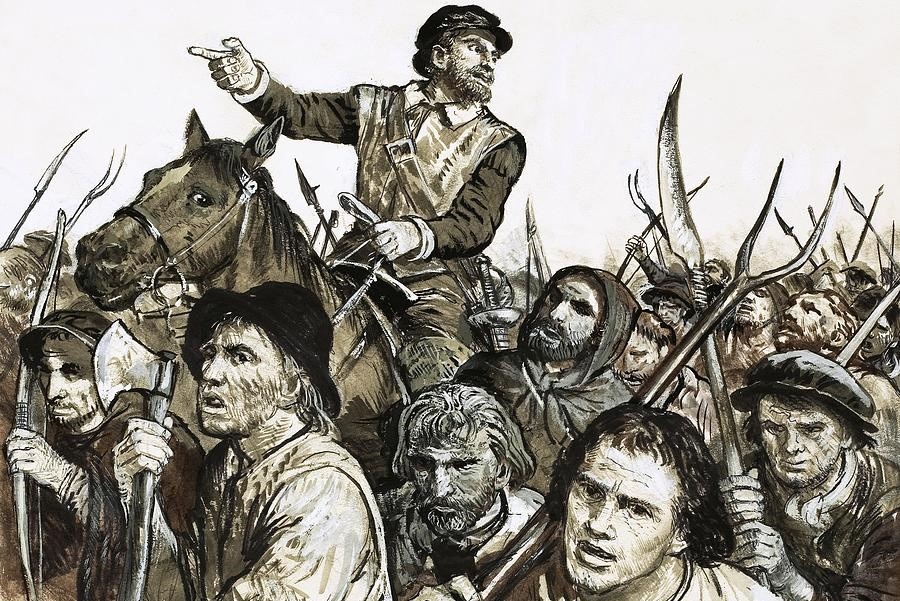Dave Putson (Unite Community – Lewisham, Greenwich, Bexley), shares his thoughts on an account of historical struggles of working people, and on some modern issues on the left. [Published 2018 – Bookmarks]
——————————
I think I should start off by stating that this was a surprisingly enjoyable read. Empson limits his analysis to ten specific historical episodes based over a 600-year period. Some are well-known and understood to most, as they have been written about extensively, others not quite so much!
The book deals with Wat Tyler’s Peasants revolt (1381), and other revolts led by Jack Cade (1450) and Robert Kett (1549) and the Levellers in the 1640s but also deals with other, lesser-known revolts or uprisings, as late as the 19th century.
In the first half of the book, the explanation of the issues is detailed, with some very good expressions of what I can call a very trusting nature of the “commons” or as we would more likely refer to then these days as “working people”. The one behaviour that is repeated over and over again, and can be seen as also still being actioned today, is the “common” working people mostly expressing their annoyance, anger or disregard of the ruling classes but still inviting members of the “gentry” to lead their protests and campaigns.
This book is full of such campaigns and actions and you think, “Ha, they were so naive in those times,” and then you have to pull yourself up short and realise that we are continuing to make the same mistakes. The book expresses how these gentry types have been in some agreement with the commons, but not fully endorsing their proposed actions. They then either lead and then try and nullify any effective action, or simply realise that they are likely to lose a whole lot of their wealth and property if they persist with support for this or that campaign so try and stall or simply sell out those that have naively invited these people to lead them.

And as much as I would like to denounce the idea that this behaviour still persists, I have to accept that I am as culpable in this regard as anyone of those referenced in the Peasants revolt or Jack Cades revolt!!
Working people need to take charge
Not long after the Tories came back to power in 2010, I went to a meeting in London, supposedly with the intent upon re-activating working class resistance. Virtually every speaker stood up, speechified, with the import of virtually everyone saying, over and over again, we cannot wait for the Trades Union Leaders to lead on this, working people need to take charge… When I spoke, I simply said, “I hear that everyone wants to act, that the working classes cannot afford to wait for the TU leaders, so let us put a date and time on whatever we decide and let us make it happen”. The room went deathly silent; I was looked at as thought I had announced “aliens had landed…”, and then the speechifying resumed with “we cannot wait for the Trades Union Leaders to lead on this, working people need to take charge...” And here we are in 2023 and still I am waiting for those speechifiers to take charge for the working classes, not waiting for TU leaders, but lead the action…. and it hasn’t happened.
Everyone in 2016 onwards was cheering on Jeremy Corbyn, many chanting his name to a popular refrain, but not enough people actually stepped up when he was trying to deal with both the current establishment, the hostile media, and many of those in his own party who declared friendship whilst plotting to remove him because his ideas might compromise their privileged positions and finances. Too many people in local areas stepped back and simply left him to it, with a few marshals around him, and expected him to somehow deliver the Shangri-la that we all wanted. And Corbyn’s own illusions in “unity” with his enemies in the party hindered attempts to effectively organise in the grass-roots against the Labour right. Social media posts should not be mistaken for solid organisation in branches to take back the Labour movement for working people.
Parliamentarians and their allies in the media successfully plotted and schemed Corbyn’s downfall. Some in the movement responded with depression or demoralisation, as if all was lost. The replacement seems to offer neither hope nor policies but an authoritarian view of a future we surely don’t want. Should we just wait for the next “gentry” leader to follow? Will they take up our grievances?
In the recent upsurge in disputes, Mick Lynch, General Secretary of the RMT was invited onto the media, and with an excellent brand of working-class straight talk, gave every TV media pundit an absolute shellacking! He became a hero to wide sections of the population. The Enough is Enough campaign was launched, but sadly remained a top-down brand rather than a focus for grass-roots organising. But working-class organisation needs to be patiently built from the bottom up. There is no short-cut.
I think it was Einstein that said “The first sign of madness, is repeating the same thing over and over again and expecting different results.” It has also been stated that those that fail to pay attention to history are destined to repeat it…
Discord, disruption and protest
Empson’s showing us the naivete and trusting behaviour of the “commons” goes deep, his research is thorough, and his acknowledgments and quotes are extensive, and to be welcomed. Whilst this book is limited to just ten specific areas of class struggle, it does make it clear that whilst what we are reading are just the events that are known about and recorded. These are the historical records that we can recount and offer our modern insights on. However, it does leave it pretty clear that there were huge amounts of discord, disruption and protest that have not been fully preserved in the historical record, carried out by unknown individuals that perpetuated and challenged the obscene excesses of the ruling class.
I was marvelling at ones I was reading about – the ones I knew that had maintained, anonymously, the protests at their abuse and mistreatment. In the earlier periods relayed in the book, many of the protests were violent in the extreme, and the retribution meted out by the powerful also offered no quarter. People were beheaded, properties were burned, all in the full knowledge of what they faced if they “failed” and yet, magnificently, they persisted to demand their rights.

Artist – Doughty, C.L. (1913-85)
Regardless of the consequences, our forebears, took action. Yeah, they speechified but they also applied what Nelson had emblazoned on his Victory ship many centuries later, “Deeds not Words”.
We are currently going through some of the most horrendous class attacks in recent history. We have our public services being destroyed and privatised, our NHS gutted, both as a service and financially, people’s wages are being annihilated, regardless of some of the more recent Trades Union actions and limited victories. Once-public services, now privatised, are inflating excessively their charges to ordinary working people. This is culminating in mass anger in all differing walks of our society. And once again we see a similar theme throughout both the history Empson has written about, and our lived experience – food prices are being hiked beyond the reach of many of our working-class communities. We are frustrated with a kleptocratic, corrupt and venal government and a dishonest and corrupted opposition (with a few exceptions!!) that offers little or nothing in the way of an alternative.
Previous generations, despite the potential for being hanged, drawn and quartered, fought back to assert their rights. In many parts of the world people today lead heroic struggles for justice. In Britain, the US and many European countries, the workers’ movement, faced with vicious attacks on its rights and living standards has started to wake up after decades of demoralisation, but this is just a shadow of the battles that will need to be fought in future.
This country has a rich tradition of resistance by peasants, artisans and workers. We should read and be inspired by Empson’s book and the history of past struggles that it describes. Let’s applaud Kett and his rebellious ways, even if you don’t necessarily proceed to his suggestion in 1549 to “Kill all the gentlemen”!



